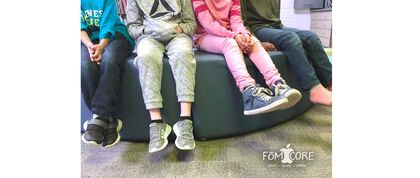Loading...

Historically, “old school” education has been teacher-centered–and all about driving round pegs into square holes
But as we understand more and more about multiple intelligence and inclusive learning, we now understand that rote memorization and inflexible environments couldn’t be further from best practice. Instead, student-centered learning is the gold standard, with an emphasis on what’s known as 21st-century education. Your classroom design can play a big role in supporting both. Here’s how:
Make it Flexible
As we’ve recently discovered, there are multiple types of learners. From visual students to note-takers, introverts to extroverts, and group-lovers to individual stars, a static classroom setup does not suit all – hence the need for flexible furniture. Layer in the desire for designated education zones, like labs, group work, and quiet spaces for reading, and agility becomes even more important. Fōmcore products were created with these needs in mind.
Foster Learning
Educational theories point out that humans are social learners by nature. Based on this, 21st-century learning advocates problem-solving, cooperative learning and reciprocal teaching. Setting up your classroom to support collaborative learning and social activity lays the groundwork for these initiatives.
Support Movement
Let’s be honest–kids aren’t great at sitting for long periods. Some adults aren’t, either! Furniture that can shake out the wiggles, burn extra energy and allow a bit of fidgeting is known to improve concentration and focus. Kidney seating and moveable furniture embraces activity while minimizing distraction.
Ready to update your classroom to facilitate better learning? Let’s start a conversation about your classroom needs!
References
McLeod, S. A. (2016, Feb 05). Bandura – social learning theory.
Retrieved from https://www.edutopia.org/blog/why-learning-space-matters-ramona-persaud